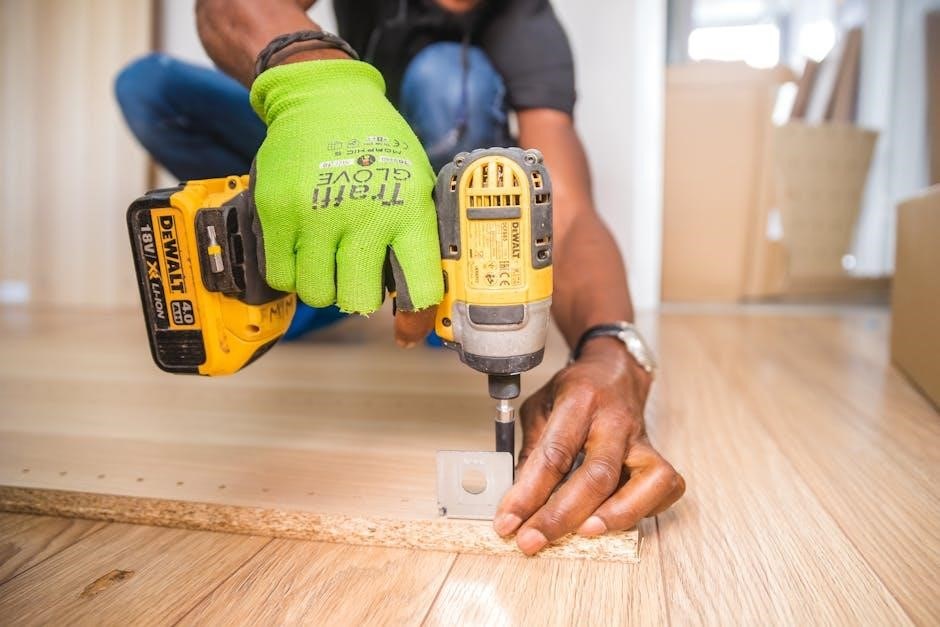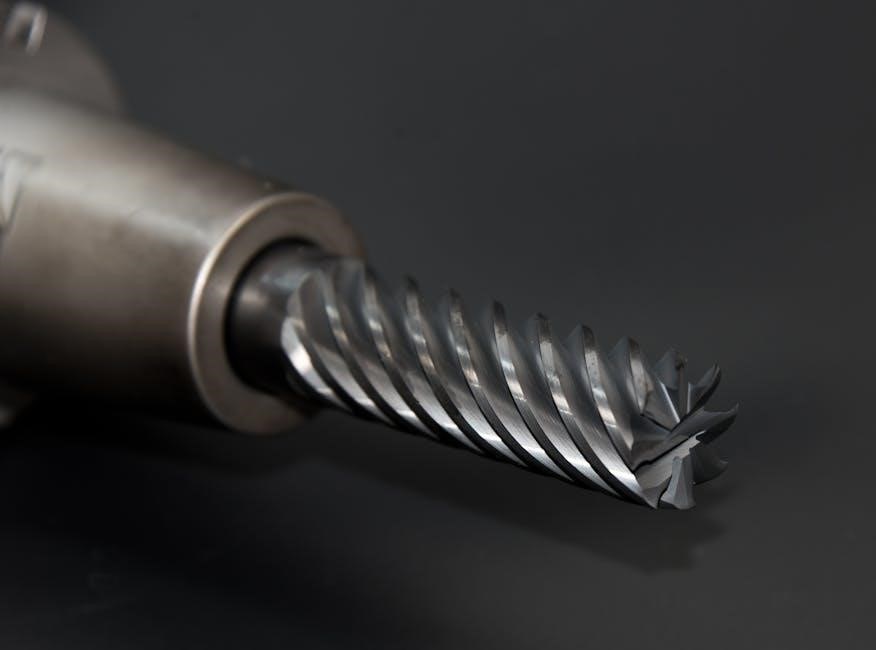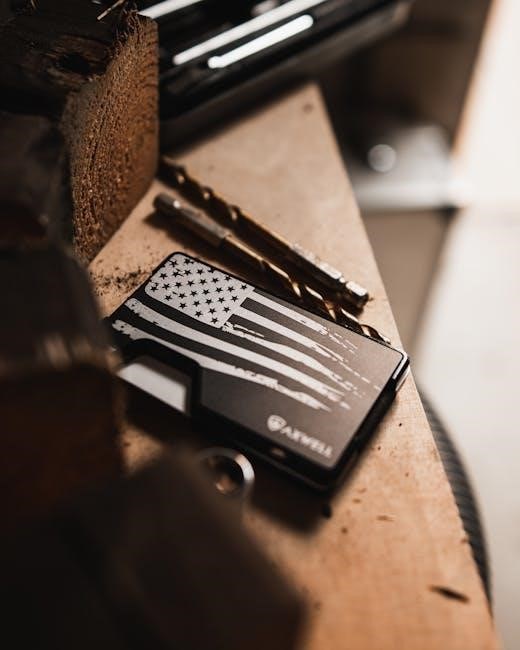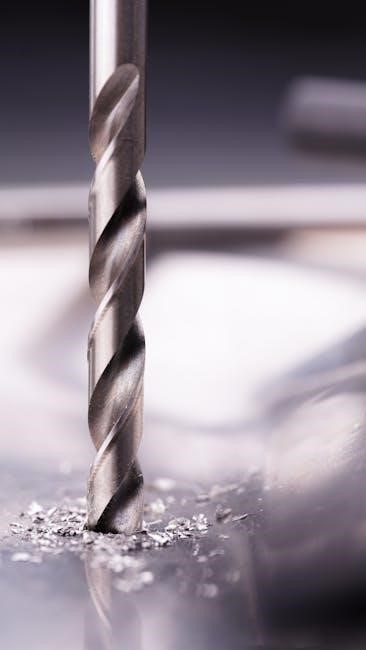drill bit guide

Drill bits are essential tools for DIY projects and construction, attached to drills to create holes or drive screws. Available in various types, they cater to different materials like wood, metal, and masonry. This guide explores their uses, materials, and selection tips to enhance your drilling experience.

Types of Drill Bits
Drill bits come in various types, each designed for specific tasks. Twist bits are versatile for general drilling, while masonry bits excel in concrete. Forstner and brad point bits are ideal for woodworking, and spade bits handle large holes. Hole saws are perfect for cutting precise circular openings in materials.
Twist Drill Bits
Twist drill bits are the most common and versatile type of drill bit, suitable for drilling holes in a wide range of materials, including metal, wood, and plastic. They are characterized by their helical flute design, which helps to remove debris efficiently and maintain straight drilling. Twist bits typically feature a 118-degree point angle, making them ideal for general-purpose drilling. They are available in various sizes and lengths, allowing for flexibility in different projects.
One of the key advantages of twist drill bits is their ability to drill through multiple materials without requiring a change of bit. They are particularly effective in metalworking, where precision and speed are crucial. However, they may not be the best choice for very hard materials like concrete or brick, where masonry bits are more appropriate. To ensure optimal performance, twist drill bits should be used with the correct drilling speed and lubrication when working with metal.
Regular maintenance, such as keeping the bits sharp and clean, can significantly extend their lifespan. Dull bits can lead to increased friction and heat, which may damage the material or the bit itself. Overall, twist drill bits are a must-have in any toolkit, offering reliability and versatility for a variety of drilling tasks.
Masonry Drill Bits
Masonry drill bits are specifically designed for drilling into hard, abrasive materials such as brick, concrete, stone, and mortar. These bits are constructed with durable materials and unique features to withstand the rigors of masonry work. The tip of a masonry bit is typically made from tungsten carbide, a hard, wear-resistant material that can handle the tough, gritty nature of masonry surfaces.
The flute design of masonry bits is optimized for removing dust and debris efficiently, which is crucial when drilling through dense materials. They often feature a spiral flute that helps to clear particles quickly, preventing the bit from overheating or binding. Masonry bits are also designed to work in conjunction with hammer drills, which provide the necessary impact force to penetrate tough surfaces effectively.
These bits are ideal for construction projects, home renovations, and any task that involves drilling into masonry. They are available in various diameters and lengths to accommodate different applications. When using masonry drill bits, it’s important to maintain proper drilling technique, such as applying steady pressure and using sufficient water or coolant to reduce friction and extend the bit’s lifespan; With their robust construction and specialized design, masonry drill bits are essential for achieving precise, durable results in masonry projects.
Forstner Drill Bits
Forstner drill bits are specialized tools designed primarily for woodworking applications. They are ideal for creating flat-bottomed holes in wood, making them essential for furniture making, cabinetry, and other woodworking projects. Unlike twist drill bits, Forstner bits are designed to remove material efficiently while maintaining precise control over the hole’s depth and edge quality.
The unique design of Forstner bits features a central spur that guides the bit and ensures a clean, accurate cut. The two cutting edges on either side of the spur remove material as the bit rotates, creating a smooth, splinter-free hole. This makes them particularly useful for drilling large-diameter holes or for applications where a professional finish is required.
Forstner bits are typically used in drill presses, where their precision and control can be fully utilized. They are available in various sizes and are often used for creating holes for dowels, screws, or other fasteners. While they are primarily used in woodworking, they can also be adapted for drilling in plastic and soft metals. Proper maintenance, such as keeping the cutting edges sharp, is crucial to ensure optimal performance and longevity of the bit.
Overall, Forstner drill bits are a must-have for woodworkers and professionals who need to create precise, clean holes in wood. Their unique design and functionality make them indispensable for achieving high-quality results in woodworking projects.
Brad Point Drill Bits
Brad point drill bits are specialized tools designed primarily for woodworking and other applications requiring precise hole drilling. Their unique design features a sharp, pointed tip (the “brad point”) that helps guide the bit and prevents wandering on the material’s surface. This makes them ideal for creating accurate, clean holes in wood, plastic, and other soft materials.
The brad point tip is surrounded by cutting edges that remove material as the bit rotates. These bits are particularly useful for drilling flat-bottomed holes and are often preferred for applications where a high level of precision is required. They are commonly used in furniture making, cabinetry, and other woodworking projects where clean, splinter-free holes are essential.

Brad point drill bits are available in various sizes and are suitable for drilling through a wide range of materials, including hardwoods, softwoods, and composite materials. They are also effective for drilling pilot holes for screws or dowels. One of the key advantages of these bits is their ability to maintain straight, accurate drilling without the need for a pilot hole, making them a favorite among woodworkers and DIY enthusiasts.
Overall, brad point drill bits are a versatile and essential tool for anyone working with wood or other soft materials. Their precision, accuracy, and ability to create clean holes make them a valuable addition to any workshop or toolbox.
Spade Drill Bits

Spade drill bits are a type of drill bit designed for rough drilling applications, particularly in wood. They are characterized by their flat, broad head and are often used for quickly removing large amounts of material. These bits are ideal for construction and DIY projects where precision is not a primary concern.
The spade drill bit features a flat, paddle-like shape with a sharp cutting edge. This design allows for aggressive material removal, making them effective for drilling large, rough holes in wood; They are commonly used for applications such as creating holes for pipes, cables, or other installations where a clean finish is not required.
Spade drill bits are typically made from high-speed steel (HSS) or carbon steel, ensuring durability and longevity. They are available in various sizes and are often used in combination with a hammer drill or impact driver for increased efficiency. However, they are not suitable for precision work or drilling in materials like metal or masonry.
One of the key advantages of spade drill bits is their ability to drill large holes quickly. However, they can cause splintering on the exit side of the material, especially in thinner woods. To minimize this, users often clamp a scrap piece of wood to the back of the workpiece to provide additional support during drilling.

Overall, spade drill bits are a practical choice for rough woodworking and construction tasks. Their robust design and aggressive cutting action make them a valuable tool for projects requiring fast and efficient hole drilling in wood.
Hole Saw Drill Bits
Hole saw drill bits are versatile tools designed for cutting large-diameter holes in various materials. Unlike traditional twist drill bits, hole saws are ideal for applications where a clean, precise hole is required. They are commonly used in woodworking, metalworking, and masonry projects.
The hole saw consists of a pilot bit and a ring of sharp teeth that rotate to cut through the material. This design allows for efficient removal of material, creating a smooth edge around the hole. They are particularly useful for tasks like installing doorknobs, cutting out circles for electrical outlets, or creating openings for pipes.
Hole saw drill bits are available in a range of sizes, from small diameters for delicate work to large diameters for heavy-duty applications. They can be used on materials such as wood, plastic, metal, and even tile, depending on the type of coating or teeth design. For example, diamond-coated hole saws are ideal for cutting through tough materials like ceramic or concrete.
One of the key benefits of hole saws is their ability to drill large holes without causing excessive material waste. However, they can generate a significant amount of heat during use, so it’s important to apply steady pressure and maintain proper lubrication. Regular maintenance, such as cleaning and sharpening the teeth, can extend the lifespan of the bit.
Overall, hole saw drill bits are a must-have for any serious DIY enthusiast or professional. Their precision and versatility make them indispensable for a wide range of drilling tasks.

Drill Bit Materials and Coatings
Drill bits are crafted from materials like High-Speed Steel (HSS), carbide, and cobalt for durability. Coatings such as titanium enhance wear resistance and reduce friction. These materials and coatings ensure optimal performance across various drilling applications, from wood to metal, improving tool life and drilling efficiency.
High-Speed Steel (HSS)
High-Speed Steel (HSS) is a popular material for drill bits due to its durability and ability to withstand high temperatures. HSS drill bits are versatile and can be used for drilling into metal, wood, and plastic. They are ideal for general-purpose drilling tasks and are widely used in both professional and DIY projects. One of the key advantages of HSS drill bits is their cost-effectiveness compared to other materials like carbide. They maintain sharpness and resist wear and tear effectively, making them a reliable choice for everyday use. HSS bits are also less brittle than other materials, reducing the risk of breakage during drilling. However, they may not perform as well as carbide bits when drilling through very hard materials or at high speeds. Regular maintenance, such as sharpening, can extend the life of HSS drill bits. Overall, HSS drill bits are a practical and affordable option for a wide range of drilling applications, making them a staple in many toolboxes.
Carbide Drill Bits
Carbide drill bits are among the most durable and versatile tools for demanding drilling tasks. Made from tungsten carbide, a hard and wear-resistant material, these bits excel in drilling through tough materials like steel, stainless steel, and titanium. They are ideal for industrial and heavy-duty applications where high-speed steel (HSS) bits may fail. Carbide bits maintain their sharpness and cutting efficiency even at high temperatures, making them suitable for continuous use in challenging environments.
One of the key advantages of carbide drill bits is their long lifespan. They resist wear and tear significantly better than HSS bits, reducing the need for frequent replacements. However, they are more brittle and prone to breakage if subjected to heavy shock or improper use. To maximize their performance, carbide bits are often used with rigid drill presses or machines that provide consistent control.
Carbide drill bits are widely used in metalworking, aerospace, and automotive industries. They are also a favorite among professionals who require precision and reliability. While they are more expensive than HSS bits, their superior performance and longevity make them a worthwhile investment for serious projects. Proper maintenance, such as storing them in a dry place and avoiding overheating, can further extend their service life.
Titanium Coatings
Titanium coatings are a popular choice for enhancing the performance and longevity of drill bits. These coatings, often applied through a process called titanium nitride (TiN) coating, provide a thin, hard layer that improves wear resistance and reduces friction. This makes titanium-coated drill bits ideal for drilling through tough materials like steel, stainless steel, and titanium alloys.
The primary benefit of titanium coatings is their ability to withstand high temperatures generated during drilling. By reducing friction, these coatings prevent overheating, which can damage both the drill bit and the workpiece. Additionally, the coating enhances the bit’s durability, allowing it to maintain its sharpness and cutting efficiency over time. This results in cleaner, more precise holes and extended tool life.
Titanium-coated drill bits are particularly useful in metalworking and automotive applications, where drilling through hard, abrasive materials is common. They are also favored by professionals and DIY enthusiasts who need reliable tools for demanding projects. While they are more expensive than uncoated bits, the improved performance and extended lifespan make them a cost-effective choice for frequent use.
Overall, titanium coatings are a practical upgrade for drill bits, offering enhanced durability, thermal resistance, and cutting efficiency. They are a worthwhile investment for anyone seeking high-quality tools for challenging drilling tasks.
Cobalt Drill Bits
Cobalt drill bits are a premium choice for demanding drilling applications, particularly in metalworking. Made from high-speed steel (HSS) alloyed with cobalt, these bits offer exceptional hardness, heat resistance, and wear resistance. Cobalt content, typically ranging from 5% to 8%, significantly enhances the bit’s ability to withstand high temperatures and maintain sharpness when drilling through tough materials like stainless steel, titanium alloys, and hardened steel.
The key advantage of cobalt drill bits is their durability and cutting efficiency in challenging conditions. They are ideal for industrial and automotive applications where precision and longevity are critical. Compared to standard HSS bits, cobalt bits retain their cutting edge longer, reducing the need for frequent replacements and ensuring consistent performance over time.
While cobalt drill bits are more expensive than uncoated HSS bits, their superior performance and extended lifespan make them a cost-effective option for professionals and serious DIYers. Proper maintenance, such as using cutting oil to reduce heat buildup, can further extend their service life. For anyone tackling heavy-duty drilling tasks, cobalt drill bits are a reliable and high-performance solution.

Shank Types
Drill bit shanks are crucial for stability and compatibility with drills. Straight shanks are universal and fit most drills, while hex shanks provide a secure grip in impact drivers. Reduced shanks adapt to smaller chucks, ensuring versatility. Each type enhances drilling efficiency for specific tasks and tools.

Straight Shank
A straight shank is the most common type of drill bit shank, known for its cylindrical shape and straight design. It is widely compatible with most drill chucks and is often used for general-purpose drilling. The straight shank provides a secure grip in the drill chuck, ensuring stability during operation. Its simplicity makes it a popular choice for both DIY enthusiasts and professionals. The shank’s design allows for easy installation and removal, making it versatile for various drilling tasks. Straight shanks are typically found on twist drill bits, spade bits, and other common drill bit types. They are ideal for drilling in wood, metal, and plastic materials. The straight shank’s universal compatibility ensures it works with a variety of drills, including hand drills and power drills. Its durability and ease of use make it a reliable option for everyday drilling needs. Whether you’re working on a small project or a large-scale construction site, the straight shank remains a dependable choice for consistent performance.
Hex Shank
A hex shank, also known as a hexagonal shank, is a type of drill bit shank designed for improved grip and torque. Its six-sided design provides a secure fit in the drill chuck, reducing slippage during operation. This makes it ideal for high-torque applications and heavy-duty drilling. Hex shanks are commonly used in power tools, particularly impact drivers and cordless drills, where the increased grip ensures consistent performance. The hexagonal shape prevents the bit from slipping out of the chuck, even under intense pressure, making it a favorite for professionals and DIY enthusiasts alike. Hex shanks are also easy to install and remove, as they fit snugly into the chuck without requiring additional adapters. They are widely used in industrial and construction settings, where reliability and precision are critical. The hex shank’s robust design ensures minimal vibration and maximum control, making it suitable for drilling through tough materials like metal and thick wood. Its popularity stems from its durability and compatibility with a variety of drill bits, including twist bits, spade bits, and hole saws. Whether you’re working on a demanding project or routine maintenance, the hex shank offers unparalleled stability and efficiency.

Reduced Shank
A reduced shank drill bit features a shank diameter smaller than the bit itself, allowing for greater flexibility and reduced stress on the drill chuck. This design is particularly useful in metalworking, where high-torque operations can strain standard shanks. The reduced shank ensures the bit remains securely held, minimizing the risk of slippage or damage. Its smaller diameter also enables easier handling in tight spaces, making it ideal for precision drilling. Reduced shanks are often used with high-speed steel (HSS) and carbide bits, where the focus is on maintaining accuracy and durability. The reduced size does not compromise the bit’s performance, as the cutting edges remain robust and capable of handling tough materials. Proper alignment in the chuck is crucial to prevent vibration and ensure consistent results. Reduced shanks are a practical choice for professionals and DIYers alike, offering a balance of strength and maneuverability. Their versatility makes them suitable for a wide range of drilling tasks, from intricate metalwork to heavy-duty construction projects. By optimizing both stability and flexibility, reduced shanks enhance the overall drilling experience, ensuring precise and efficient hole creation.





